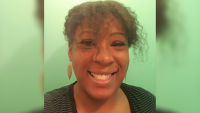Learning to live with my stammer

From a young age, Andy Schofield found solace in playing music. Growing up, however, he realised he needed to start expressing himself more through his voice. Here he tells us what he's learnt from his journey.
I think all of us want our voice to be heard, in our own way. I am a musician, so for me that way has been music. I first began playing the saxophone at age 11 and soon found I had a natural aptitude, but more importantly a way of expressing myself without speaking.
For as long as I can remember I have had a stammer. Even by this early age it had begun to lay its roots in my personality: lack of confidence, guilt, low self-esteem — the whole bag of tricks. Music quickly became an outlet, a space of my own away from the difficulties of school life.
I first began playing the saxophone at age 11 and soon found I had a natural aptitude, but more importantly a way of expressing myself without speaking.
My story is no doubt a familiar one to other people who stammer. School was a horror show of embarrassment, shame and fear. Morning registration was an ordeal. In my school we had to respond to our name being called with "present". Its plosive 'p' sound was particularly difficult. I can still remember the knot of tension building in my chest as the roster of names rolled around to mine. As my surname begins with 's' it was a long wait. I would pretend not to hear, fake a cough, or just stammer it out, and it would be over — until afternoon registration of course.
Lessons were often worse, in particular Latin with an elderly priest: a big man and a bully who shouted until he frothed at the mouth and brandished a walking stick, which promised something worse. His lessons were mostly question and answer, out loud. They became a thing of dread.
Things beginning to change
As time passed, I withdrew myself from school life. It was easier to feign lack of knowledge or ability than confront my speech difficulty. Music became my refuge, and I got pretty good at it, doing well at music college and becoming a professional. But, as I grew into adulthood, I began to feel a need to express myself with my other voice: to speak. If I learned to use my speaking voice, I felt I could achieve more.
When I started out in the late 80s, business was done by telephone, which made me a reluctant leader or organiser of musical projects. It's not that I didn't try, but using the phone became a torment, a task I would put off until the last possible moment. I'm not such a bad speaker in social situations, but when I have to say a particular word at a particular time, the trouble begins. I've often ordered different drinks or meals, unable to ask for the thing I actually wanted!
As I grew into adulthood, I began to feel a need to express myself with my other voice: to speak. If I learned to use my speaking voice, I felt I could achieve more.
Text messaging and email changed things, but the ghost of stammering past was lurking in my unconscious mind. I was still a reluctant leader: the fear, the lack of confidence was ingrained. I almost gave up. What I can see now is that I needed not to try to 'overcome' the stammer, but to learn to live with it, and to undo the deeper damage done in my early life. I had to treat the stammer and my lack of confidence as separate issues. I am fortunate to have a wonderful partner, who encouraged without demanding and supported without expectation. Slowly, things began to change. I began to find my voice, to find myself.
These days, in my adopted home of Prague, I lead a 16-piece jazz orchestra. I lead rehearsals, speak to the audience during concerts, teach and give masterclasses. In my school days, although I enjoyed performing, I would never speak on stage. I was terrified of it. Now I realise that it wasn't the situation that was the problem — I like speaking in public — but the fact that I stammer. The stammer is still there, but I've created ways of dealing with it. If I use my own words, I can talk around the words I get stuck on. I practise so I know roughly what I'm going to say.
What I can see now is that I needed not to try to 'overcome' the stammer, but to learn to live with it... I had to treat the stammer and my lack of confidence as separate issues.
I've had failures, but I've come to feel secure in this environment on stage. I find that other people are content for me to be the speaker, because they are more nervous of the situation than I am.
I still focus on the creative rather than the business side, and I've never really conquered my fear of the telephone. The fingers of guilt still tug my sleeve. I feel I should be able to do it, and it's somehow weak to rely on others. But in my better moments I know I've come a long way. It hasn't merely been about coping, but learning about myself, finding strength I didn't know was there, and accepting the imperfections. My stammer and me are old friends now. Well, maybe not friends, but colleagues at least. We've learned to live together.
You can listen to some of Andy's music on his website andyschofieldmusic.com
Read more Your Voice articles.
Would you like to write an article? See Submit Something For The Site or email editor@stamma.org for details.

































